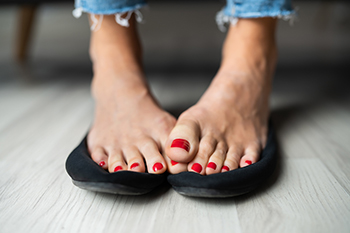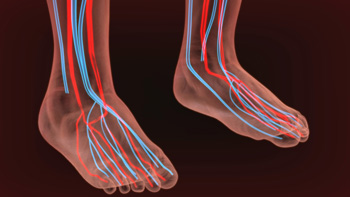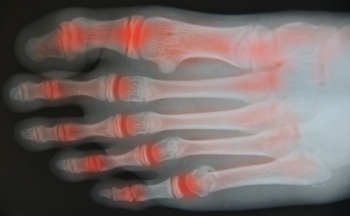
Obesity casts a profound shadow over foot health, influencing various aspects of function and well-being. Excessive body weight places immense pressure on the feet, exacerbating biomechanical stress and strain. The increased load on weight-bearing structures, such as joints, ligaments, and tendons, can lead to structural changes, including flattening of the arches and misalignment of the foot bones. Consequently, individuals with obesity are more susceptible to foot ailments such as plantar fasciitis, osteoarthritis, and stress fractures. Moreover, the excess fat tissue surrounding the feet may impede circulation and impair healing processes, predisposing to conditions like peripheral artery disease and delayed wound healing. Mobility and balance may also be compromised, increasing the risk of falls and injuries. Addressing obesity through lifestyle modifications, including dietary changes and regular exercise, is essential not only for overall health but also for managing the adverse effects on foot health. If you are overweight and have developed foot pain, it is suggested that you contact a podiatrist who can help you with relief and management tips.
Obesity has become very problematic at this point in time and can have extremely negative effects on the feet. If you’re an obese individual and are concerned about your feet, contact one of our podiatrists from Sayville Foot Care. Our doctors can provide the care you need to keep you pain-free and on your feet.
Obesity and Your Feet
Since your feet are what support your entire weight when standing, any additional weight can result in pain and swelling. Being overweight is one of the main contributors to foot complications.
Problems & Complications
Extra Weight – Even putting on just a few extra pounds could create serious complications for your feet. As your weight increases, your balance and body will shift, creating new stresses on your feet. This uneven weight distribution can cause pain, even while doing the simplest tasks, such as walking.
Diabetes – People who are overweight are at serious risk of developing type-2 diabetes, which has a drastic impact on the health of your feet. As you get older, your diabetes might worsen, which could lead to loss of feeling in your feet, sores, and bruises. You could also become more prone to various infections.
Plantar fasciitis – Pressure and stress that is placed on muscles, joints, and tendons can trigger plantar fasciitis, which is an inflammation of tissue that forms along the bottom of the foot.
If you have any questions please feel free to contact our office located in Sayville, NY . We offer the newest diagnostic and treatment technologies for all your foot and ankle needs.

Plantar hyperhidrosis, a condition characterized by excessive sweating of the feet, poses challenges for those affected, often leading to discomfort and embarrassment. Several factors contribute to this condition, including overactive sweat glands triggered by the sympathetic nervous system. Genetics play a significant role, as individuals with a family history of hyperhidrosis are more prone to developing the condition. Hormonal changes, such as those occurring during puberty or menopause, can also exacerbate sweating. Additionally, medical conditions like diabetes, thyroid disorders, and infections may contribute to plantar hyperhidrosis. Psychological factors like stress, anxiety, or nervousness can further amplify sweating episodes. Furthermore, wearing tight or poorly ventilated footwear, particularly in warm climates, can worsen symptoms. If you are affected by plantar hyperhidrosis, it is strongly suggested that you visit a podiatrist who can provide you with effective relief methods.
If you are suffering from hyperhidrosis contact one of our podiatrists of Sayville Foot Care. Our doctors can provide the care you need to attend to all of your foot and ankle needs.
Hyperhidrosis of the Feet
Hyperhidrosis is a rare disorder that can cause people to have excessive sweating of their feet. This can usually occur all on its own without rigorous activity involved. People who suffer from hyperhidrosis may also experience sweaty palms.
Although it is said that sweating is a healthy process meant to cool down the body temperature and to maintain a proper internal temperature, hyperhidrosis may prove to be a huge hindrance on a person’s everyday life.
Plantar hyperhidrosis is considered to be the main form of hyperhidrosis. Secondary hyperhidrosis can refer to sweating that occurs in areas other than the feet or hands and armpits. Often this may be a sign of it being related to another medical condition such as menopause, hyperthyroidism and even Parkinson’s disease.
In order to alleviate this condition, it is important to see your doctor so that they may prescribe the necessary medications so that you can begin to live a normal life again. If this is left untreated, it is said that it will persist throughout an individual’s life.
A last resort approach would be surgery, but it is best to speak with your doctor to find out what may be the best treatment for you.
If you have any questions please feel free to contact our office located in Sayville, NY . We offer the newest diagnostic and treatment technologies for all your foot and ankle needs.

When it comes to foot health, circulation plays an important role. Poor circulation can lead to discomfort, swelling, and severe complications. However, there is a natural solution that often gets overlooked, which is vitamins. Incorporating essential vitamins into your diet can significantly improve foot circulation and overall vascular health. Vitamin E, known for its antioxidant properties, aids in widening blood vessels and promoting efficient blood flow to the extremities, including the feet. Similarly, vitamin C supports collagen production, strengthening blood vessel walls and enhancing circulation. Additionally, vitamin B3, or niacin, has vasodilating effects, meaning it helps widen blood vessels, thus improving blood flow. Additionally, omega-3 fatty acids, while not vitamins per se, are essential for cardiovascular health. Found in abundance in fish oil and certain seeds, omega-3s can reduce inflammation and enhance blood circulation throughout the body, including the feet. By incorporating these essential nutrients into your diet through whole foods or supplements, you can effectively improve foot circulation, ensuring optimal foot health and comfort for years to come. If you have poor foot circulation and are seeking relief techniques, it is suggested that you consult a podiatrist who can discuss how vitamins can play a role in treatment.
While poor circulation itself isn’t a condition; it is a symptom of another underlying health condition you may have. If you have any concerns with poor circulation in your feet contact one of our podiatrists of Sayville Foot Care. Our doctors will treat your foot and ankle needs.
Poor Circulation in the Feet
Peripheral artery disease (PAD) can potentially lead to poor circulation in the lower extremities. PAD is a condition that causes the blood vessels and arteries to narrow. In a linked condition called atherosclerosis, the arteries stiffen up due to a buildup of plaque in the arteries and blood vessels. These two conditions can cause a decrease in the amount of blood that flows to your extremities, therefore resulting in pain.
Symptoms
Some of the most common symptoms of poor circulation are:
- Numbness
- Tingling
- Throbbing or stinging pain in limbs
- Pain
- Muscle Cramps
Treatment for poor circulation often depends on the underlying condition that causes it. Methods for treatment may include insulin for diabetes, special exercise programs, surgery for varicose veins, or compression socks for swollen legs.
As always, see a podiatrist as he or she will assist in finding a regimen that suits you. A podiatrist can also prescribe you any needed medication.
If you have any questions, please feel free to contact our office located in Sayville, NY . We offer the newest diagnostic and treatment technologies for all your foot care needs.

Arthritis, a condition characterized by inflammation and stiffness in the joints, can significantly impact one's quality of life. While medications and therapies are commonly prescribed to manage arthritis symptoms, the power of exercise in providing relief cannot be overstated. Regular physical activity helps to maintain joint flexibility, strengthen muscles surrounding the joints, and improve overall mobility. Low-impact exercises such as walking, swimming, and cycling are particularly beneficial for individuals with arthritis, as they minimize stress on the joints while promoting cardiovascular health and muscle strength. Additionally, exercises focusing on range of motion and flexibility, such as yoga and tai chi, can help alleviate stiffness and improve joint function. Engaging in consistent exercise routines not only reduces pain and inflammation but also enhances mood and promotes a sense of well-being. If you have arthritis and it is affecting your feet, it is suggested that you consult a podiatrist who can provide you with specific stretches and treatment targeted for relief.
Arthritis can be a difficult condition to live with. If you are seeking treatment, contact one of our podiatrists from Sayville Foot Care. Our doctors can provide the care you need to keep you pain-free and on your feet.
Arthritic Foot Care
Arthritis is a term that is commonly used to describe joint pain. The condition itself can occur to anyone of any age, race, or gender, and there are over 100 types of it. Nevertheless, arthritis is more commonly found in women compared to men, and it is also more prevalent in those who are overweight. The causes of arthritis vary depending on which type of arthritis you have. Osteoarthritis for example, is often caused by injury, while rheumatoid arthritis is caused by a misdirected immune system.
Symptoms
- Swelling
- Pain
- Stiffness
- Decreased Range of Motion
Arthritic symptoms range in severity, and they may come and go. Some symptoms stay the same for several years but could potentially get worse with time. Severe cases of arthritis can prevent its sufferers from performing daily activities and make walking difficult.
Risk Factors
- Occupation – Occupations requiring repetitive knee movements have been linked to osteoarthritis
- Obesity – Excess weight can contribute to osteoarthritis development
- Infection – Microbial agents can infect the joints and trigger arthritis
- Joint Injuries – Damage to joints may lead to osteoarthritis
- Age – Risk increases with age
- Gender –Most types are more common in women
- Genetics – Arthritis can be hereditary
If you suspect your arthritis is affecting your feet, it is crucial that you see a podiatrist immediately. Your doctor will be able to address your specific case and help you decide which treatment method is best for you.
If you have any questions, please feel free to contact our office located in Sayville, NY . We offer the newest diagnostic and treatment technologies for all your foot care needs.
